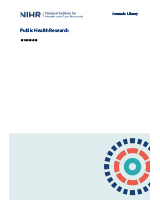This work was produced by Naughton et al. under the terms of a commissioning contract issued by the Secretary of State for Health and Social Care. This is an Open Access publication distributed under the terms of the Creative Commons Attribution CC BY 4.0 licence, which permits unrestricted use, distribution, reproduction and adaptation in any medium and for any purpose provided that it is properly attributed. See: https://creativecommons.org/licenses/by/4.0/. For attribution the title, original author(s), the publication source – NIHR Journals Library, and the DOI of the publication must be cited.
NCBI Bookshelf. A service of the National Library of Medicine, National Institutes of Health.
Naughton F, Hope A, Siegele-Brown C, et al. A smoking cessation smartphone app that delivers real-time ‘context aware’ behavioural support: the Quit Sense feasibility RCT. Southampton (UK): National Institute for Health and Care Research; 2024 Apr. (Public Health Research, No. 12.04.)

A smoking cessation smartphone app that delivers real-time ‘context aware’ behavioural support: the Quit Sense feasibility RCT.
Show detailsThe automated trial design worked effectively and implemented procedures enabled trial delivery with satisfactory or above satisfactory rates in all key feasibility outcomes other than the saliva sample return rate. This included higher estimated outcome completion rates than expected, three out of four Quit Sense participants installing the app and half of these using it for longer than 1 week. Evidence generated regarding the benefit of increasing incentive payments from £10 to £20 for improving follow-up engagement would suggest that increased incentives would likely improve saliva sample return rates in future work. The trial also demonstrated the feasibility of recruiting exclusively via online advertising for a lower than anticipated cost, although further refinements in advert filtering or consideration of other platforms may be needed to help increase the diversity of the sample.
Based on the abstinence outcome, representing the anticipated primary outcome for a definitive trial, Quit Sense led to a higher rate of biochemically verified abstinence relative to usual care and all end-of-trial abstinence measures favoured the app and represented a clinically meaningful effect estimate, although return rates for saliva samples were imbalanced between arms. Nevertheless, this work adds to a growing body of evidence supporting the efficacy potential of smartphone apps for smoking cessation. How Quit Sense might bring about a change in smoking behaviour is still not well understood, although, for some, learning about their own smoking triggers through the app was felt to be key. This remains an important research question for future studies.
Progression to a definitive trial to assess the effectiveness of Quit Sense, with minor refinements to trial procedures and the app as discussed above, is warranted.
- Conclusions (implications for health care, recommendations for research) - A smo...Conclusions (implications for health care, recommendations for research) - A smoking cessation smartphone app that delivers real-time ‘context aware’ behavioural support: the Quit Sense feasibility RCT
Your browsing activity is empty.
Activity recording is turned off.
See more...